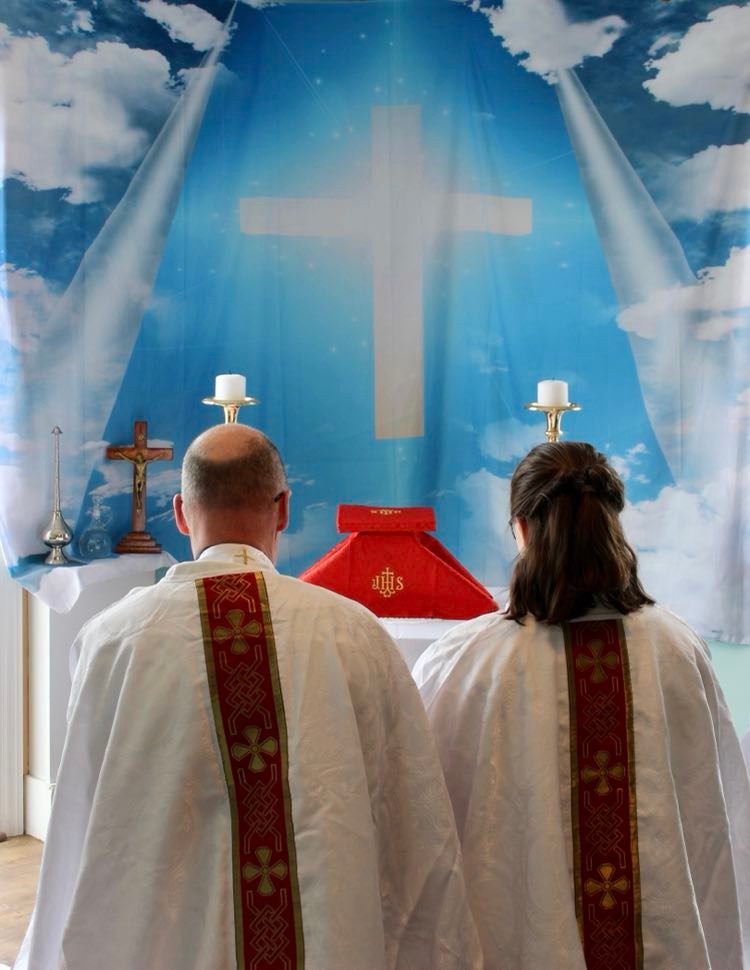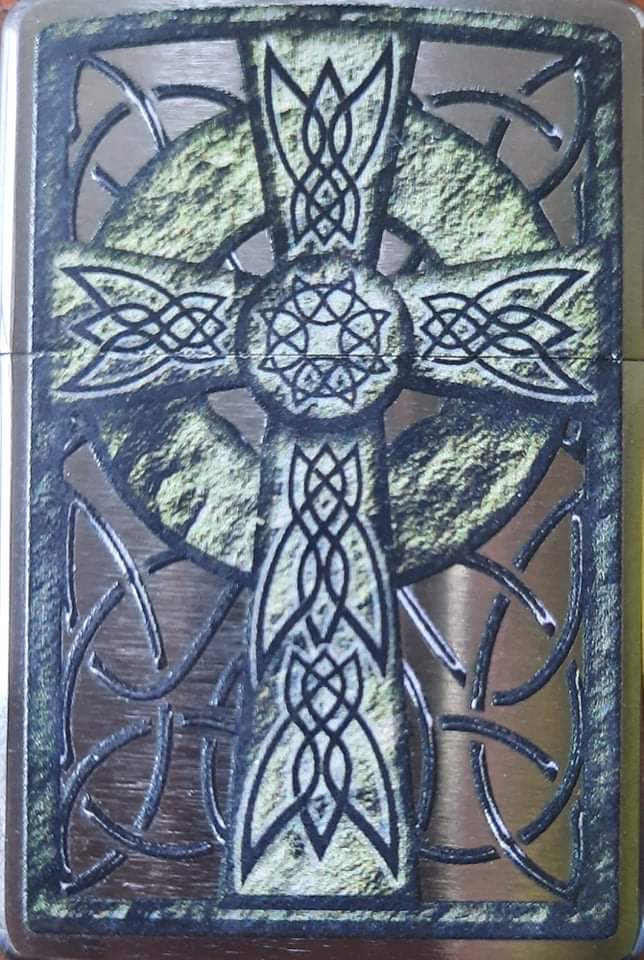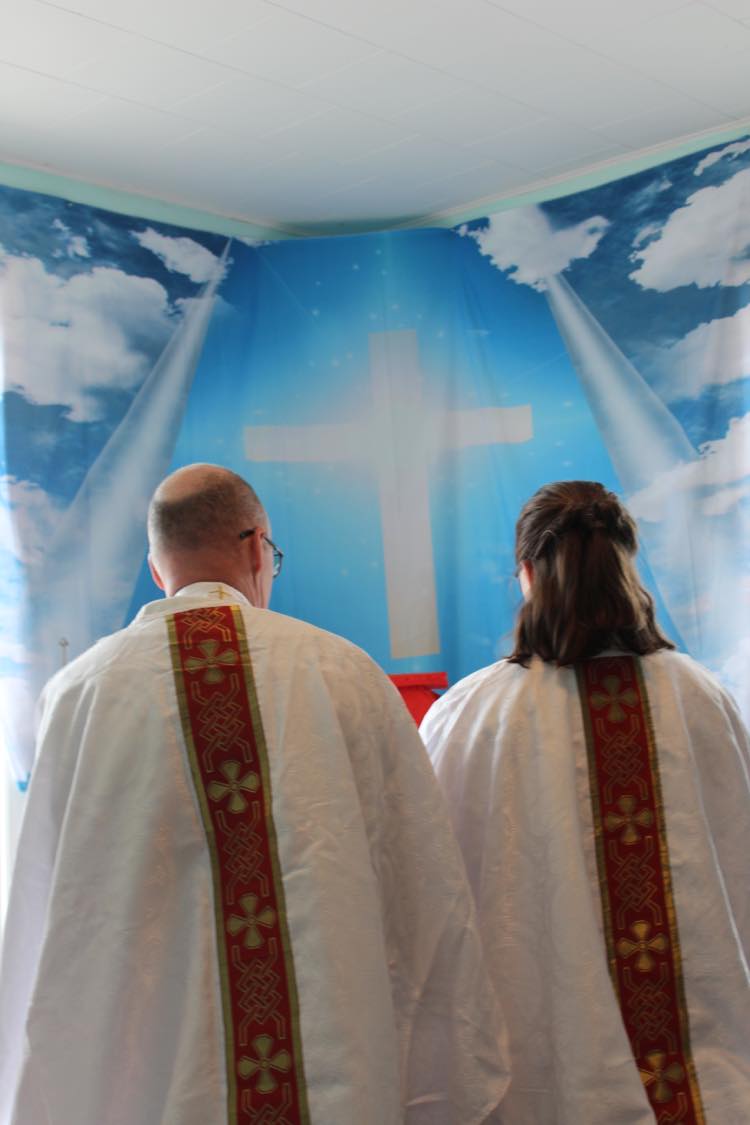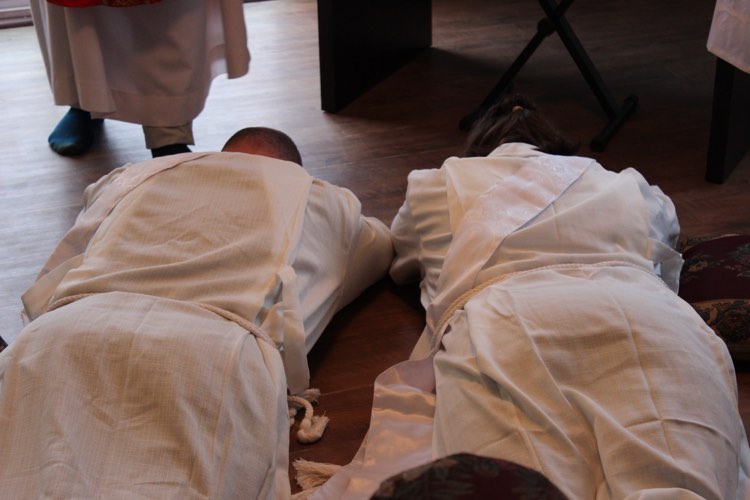- Home
- simply catholic
- Catholic Sacraments
- ConfessionalCoaching
Simply Catholic and Welcoming You
Confessional Coaching for Priesthood and Laity

St. Brigit's Cross
First let me acknowledge my mentors. Three people in particular who taught me about the confessional, making a good confession and the types of penitents routinely encountered. With their pointers on the best ways to assist each "type" of penitent to actually have a good confession. They provided me with wonderful confessional coaching and I now attempt to pass their wisdom along to another generation.
My own experiences have borne out the validity of their teachings. All three mentors are now passed on, yet when I hear confessions, I feel like they are still with me, coaching even now. The priesthood is a continuous line. Without those who came before us we could not be the priests we are today. Thank you to Bishop P. Coyle, Fr. J. Doran and Fr. E. Doherty whose lessons are as on point today as they were all those years ago.
Alright, let’s talk about confessional coaching highlighting stereotypes and missteps.
Confessional List Maker/Reader
When someone has a list to read from it is almost always venial sins which, canonically, do not need to be confessed. Remember confession is meant to be about mortal sins, the kind of mortal sin and the frequency of the sin.
God is not a lawyer nor an accountant. He doesn’t want your list. He wants your heart, your pure intention to reconcile with Him.
Reading from a list usually keeps people from having an emotional reaction. It can be a way to dissociate ourselves from the very sins we committed and are now confessing.
Confessional coaching hint:
As a priest, I will ask you to put your list away and focus instead on what you think and feel in your heart is most getting in the way of your walk with Jesus. So pick out what is most meaningful, what troubles you the most and let’s work from there!
Confession is about remorse, sorrow, repentance and reconciliation. Lists take you away from that. You wouldn’t approach your parents with a list of all the times you messed something up. Why do that with your Heavenly Father? Like earthly parents He wants to hear, “Hey Dad I messed some things up but most importantly I did (this). Please forgive me and help me do better.”
The “Sneak it in so the Priest Won’t Notice” Penitent
This is like the List Maker but they will list venial sins, stick a barely mentioned mortal sin in there and continue to list lesser sins hoping the priest doesn’t draw attention to the buried big item. The priest is there to help them make a good confession. They’re not confessing TO the priest. They’re confessing TO GOD. Do they really think He’ll miss it?
Confessional coaching hint:
As a priest, I will stop them there and ask them to address the issue/sin they tried to bury. Here’s the thing. They didn’t have to come to confessions yet they did. They didn’t have to confess their sin yet they did. They may be embarrassed, shameful or afraid of ‘outing’ someone else who was involved with them.
As a priest I need to honour the fact that they came to confessions and the intent for that is to reconcile with Our Lord God, Jesus Christ. I need to help them deal with what is actually bothering them and keeps them from being fully in God’s Grace.
The more bothered or ashamed they are the more they should be able to walk out of the confessional with a sense of relief. The sin is dealt with and they are spiritually in the clear.
The “Everything is a Mortal Sin” Penitent
Simply not true. If you remember from reading earlier, for sin to be mortal in nature requires three things. It must be a grave matter, done with full knowledge and full consent.
A mortal sin cuts the penitent off from God’s Grace in the sacraments. It must be truly serious to do that. One can continually commit lesser, venial sins such that they may not be considered a ‘good’ person and still not be guilty of mortal sin.
Confessional coaching hint:
They may be seeking direction for a bad habit yet that doesn’t make it a mortal sin. They may have been brought up believing everything they do is not good enough and have a crushed self image. Doesn’t make them guilty of mortal sin. They need clarification and likely reassurance.
The Confession Addict
They’ll go to confessions everyday if they can. This can become an abuse of the sacrament and may be a form of self abuse. Care must be exercised with these people as they are less likely dealing with issues of faith or sin and more likely issues around self image, even mental health issues of O.C.D. or more.
Confessional coaching hint:
For these people building relationships of trust and leading them to understand that attending Mass (which has General Absolution) takes away venial sins. An Act of Contrition prayer and receiving the Holy Eucharist, takes away venial sins.
Encourage them to make the habit more about Mass and Holy Communion and less frequent confessions. More about accepting that God really does Love them and uplifting them in their spiritual journey. Help them shift from the “I’m a sinner and unworthy” to “Jesus already Loves me and wants me to focus on loving myself”.
I will ask them outright if they truly believe that God and Jesus actually Love them? Most often this kind of “O.C.D.” habit is born from fear that they can never be worthy of God’s Love. They have faith (they’re here) yet they have no confidence or no understanding that God loves them as His child, not for what they are or what they do or don’t do.
The Vague Penitent
I used an example of this type of penitent earlier. They want to be as vague as possible and move on. Sorry! A priest will need to understand was this sin only a thought? Was it an action taken alone? Was it an action taken with others? How often did this happen?
Confessional coaching hint:
Part of Confession is naming and ‘owning’ your sins. These actions speak to a penitent's remorse and future intent. If they can minimize what they’ve done, they are avoiding remorse and increasing the likelihood of committing the sin again.
Remember the priest doesn’t need explicit details. They do need to know the actual sin, kind of sin and frequency of occurrence.
Confessing other people’s sins
Without offence, I do find this is most often a “parent” thing. A sincerely concerned parent shares what their kids and their friends are doing that they are so worried about. Often so much so that they never get around to confessing their own sins.
Confessional coaching hint:
I will stop them and explain that confession is about confessing only their own sins. If they want to share their concerns over their kids or their kids friends I will happily book time for that conversation. Just not during confessions.
The Rambler
This person talks, rambles, asks questions, starts conversations. All of which may be totally sincere, it’s just not confessions.
Confessional coaching hint:
Again I’ll offer to book time for all this (I do take it all seriously) and ask them to focus on confessions. Focus on their sins, what actually brought them to the confessional and we’ll deal with the rest in a more relaxed and appropriate time and place.

Confession is about rebuilding our relationship with Christ our Savior.
General Notes Before Continuing:
I struggle with the need to ‘classify’ penitents into ‘types’ yet recognise the need to explain and illustrate that these are not one off occurrences. Enough people fall into these ‘stereotypes’ to make grouping and describing them as such an effective way of communicating these missteps to laity and learning clergy.
These next two ‘types’ are not problems in any sense of the word yet there are enough of them to document them and give an overview of how they are usually best served in the confessional. Everyone is a distinct individual deserving of being treated as such. Still categorizing for the purpose of educating and training is an effective tool for learner clergy and the individual penitent who sees themselves as being one of these types.
My hope is that in reading this they will see how they should be served in and through the sacrament of reconciliation. My own wife and other clergy have expressed the usefulness of these explanations both to better understand their own approach to and needs from confession and to understand and help those we seek to serve.
Also I ask for understanding and/or forgiveness for my frequent use of the first person when referring to how I have experienced different people and their needs in the confessional. Different clergy have different backgrounds, different training and different approaches to meeting the needs of their congregations and penitents. The presumptive use of “we” might lead a reader to think all clergy have these experiences or handle situations as I do, and was taught to do.
I simply do not see fit to group all clergy under the techniques, experiences or understandings that I have arrived at. Individual mileage may and probably will vary. I offer my findings and experiences as a point of reference. Take from it what you find helpful and do ministry your way. It’s why you were called and we will each reach or relate to different people so there is no “right way”. I do think we would all agree that there are unfortunately several wrong ways to do ministry.
The Scapegoat Penitent
The first of my final two types of penitent I would like to illustrate I refer to as the scapegoat penitent. You see they are in actuality confessing other people's sins but they have been led to believe that these truly are their own sins!
Often raised by narcissistic parents or in otherwise abusive environments they’ve grown up with phrases like “I’m sorry you made me do that.” Or “If you didn’t do the things you do then I wouldn’t have to be like this”. “If you didn’t dress like that…..” and so on.
No matter what has occurred they’ve been convinced (brainwashed) that it was really their fault. Now they assume that if something wrong has happened they are responsible. Not so!
Confessional coaching hint:
God is incapable of lying. If I just simply give them Absolution then I, as God’s representative would be at least implying that these things were indeed this person's fault and the sin was theirs. That’s a lie I cannot take any part in.
Usually, when I explain this and make it clear that from what they have told me it is clear that these are not their sins there are many tears of total relief. Even if they went along with some of it, it was to avoid further problems or actual harm at the time thus not full consent so not a mortal sin on their part. Duress (being or feeling forced to do something) is never the same as “full consent”.
When this happens from a young age, full knowledge also is not present. They have been taught to take the blame for someone else’s sins. This can be a huge step in a long healing journey. They may have sins of their own for which they can receive Absolution. As their priest I must now help them differentiate between what they own and what has been put on them.
You want to talk about reconciliation? As a man with my own dark past I know exactly how this eureka moment feels. It can be beautiful, mind numbing and freeing all at once.
The relief and the release of pent up guilt and so many emotions is often overwhelming.
Thank the Lord for this wonderful sacrament where such absolute awakenings happen.
Out of Practice, Long Time Away Penitent
This is also a priest's favorite type of penitent. Someone who has been away from the practice of their faith for a long time who has summoned the courage to come back. The Holy Spirit is working and something has happened or is happening in their life that brought them to the confessional and their hope to reconcile with Jesus.
This is a fairly regular penitent today. They are a ‘type’ for the purpose of this discussion but they are absolutely not a misstep. They are an invitation for a priest to be part of their return to the faith and the practices of that faith.
They may have been away so long that they’ve forgotten the whole format of confession. That’s alright. These returning penitents usually make me weep from the prompting of the Spirit. Often they start with “Bless me Father for I have sinned. It’s been so long since my last confession that I just don’t remember how to do this.”
Sometimes it’s “Father, I haven't been here in years and I don’t know how to start.”
Confessional coaching hint:
I usually reply with “Brother/Sister that is so not a problem. You’re here now. Welcome and please let me walk you through the process, mostly by asking questions. Is that OK with you?”
“I want you to know you are very welcome here. That God and Jesus truly love you and that this is sacred space, you are safe here and anything we discuss is under seal, meaning I can never reveal it outside of this confessional. Do you understand all this so far?”
I’ll ask them questions from the order of confessions. So, instead of them saying things like “Bless me Father for I have sinned It’s been x weeks since my last confession.” I’ll ask if they have a rough idea of when their last confession was (how old were they perhaps helps)”.
To help set them at ease and get to know them I use F.O.R.M. This is an acronym and stands for;
- Family
- Occupation
- Recreation
- Message (where are they at in their life and spiritual journey today)
Next I’ll ask them why today? After so long, why now? This usually cuts to the heart of the matter more politely and more caring than “OK, tell me your sins”.
If they struggle I will reassure them that there is no ‘perfect’ confession and I am more than happy to help walk them through this process. When it gets to the Act of Contrition I will ask if they know it, want me to say it with them or would they prefer their own words?
Next I'll discuss "prayers of penance". Do they know a prayer or prayers that they can say? Are they comfortable with a prayer from their own heart such as, in their own words expressing to God their sorrow for their sins and their gratitude for the opportunity to have their sins absolved and renew their relationship with God and Jesus Christ?
Then give them absolution and offer to book time with them IF that is of interest to them. NO pressure, just making it clear that I am there to help only as much as they see fit.
Now, about that shorter summary, lol.

Old Celtic Cross
Confessional Coaching: Proper Confession/Reconciliation
Confession starts with the priests greeting and the penitent saying;
-“Bless me Father for I have sinned, it’s been (however long) since my last confession.”
-Briefly divulge ‘station’ (unless the priest already knows you) such as married, stay home Mom with x kids etc.
- Confess mortal sins (maybe habitual venial sins you struggle with)
-Be specific giving the actual sin, kind of sin and frequency. Thoughts only, acting alone or acting with others. Repeat for each different sin
-Signal that you are done by saying things like “These are my sins for which I’m truly sorry”
-The priest will give penance prayers
-Say the Act of Contrition Prayer (with priests help if needed or use your own words to express your sorrow for your sins)
-The priest gives absolution
-Exit the confessional. (usually to then pause and say your penance prayers)
Let me close this section with the Act of Contrition Prayer
(There are several but this is the version I grew up with.)
I confess to almighty God,
and to you, my brothers and sisters,
that I have greatly sinned through my thoughts and in my words,
in what I have done, and in what I have failed to do;
through my fault, through my own fault, through my own most grievous fault;
therefore I ask Blessed Mary ever-Virgin,
all the Angels and Saints, and you, my brothers and sisters,
to pray for me to the Lord our God.
Amen.
Recent Articles
-
Catholic-Confession
Apr 19, 25 08:53 PM
Full breakdown of the Catholic Confession Sacrament of Reconciliation -
Ordination, incardination and dismissal of clergy
Mar 03, 25 06:47 PM
Overview of Ordination to Holy Orders, incardination and dismissal of clergy -
Catholic Last Rites
Mar 03, 25 06:41 PM
An explanation of the Catholic Last Rites and Anointing of the Sick

